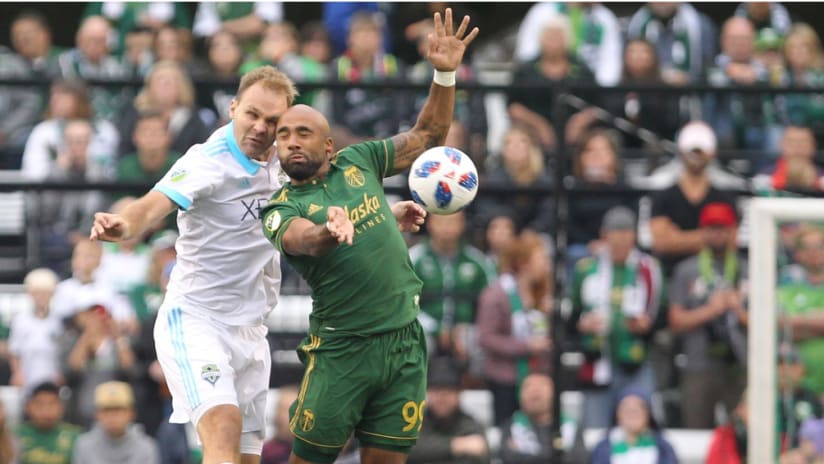Rock beats scissors. Paper beats rock. Scissors beat paper.
These are the basic fundamentals of the greatest hand game ever created (get your Thumb War nonsense out of here).
In the Western Conference right now, the top five spots are all in play. We know the teams that will (almost certainly) be in the Audi 2018 MLS Cup Playoffs, but not where they will finish. The first three teams — FC Dallas, LAFC, and Sporting Kansas City — could finish anywhere from one to three, and three through five — SKC, the Portland Timbers and Seattle Sounders — could all fluctuate.

Teams want to make the playoffs, and teams want to finish as high as possible, and teams also want favorable matchups in the playoffs. Here is where the greatest hand game ever played comes into the picture. Every team in this scenario has certain preferences, a certain style of play — they prefer to throw Rock, Paper or Scissors. A team that plays rock would prefer to play a team that throws scissors.
We can break the five teams down into the three groups:
Defend deep, forego possession, then counter (Rock): FC Dallas, Portland
Keep possession, use the ball to create goalscoring opportunities (Scissors): LAFC, SKC
Partly use possession, partly defend deep (Paper): Seattle
And the logic here follows the hand-game rules.
1. Rock-style teams hold the advantage over Scissors-style teams.
Counterattacking teams wield a tactical advantage over possession teams. Former Arsenal manager Arsene Wenger was largely right when he said it’s easier to defend and counter than it is to pass and attack. The margins on passing are much smaller than the margins on defending deep and counterattacking; a single bad pass can lead to a goal, whereas defending with eight behind the ball allows for more error.
Remember, too, that MLS teams start from relative talent parity. In Europe, the counterattacking team often loses because the counterattacking team plays that way since they have less talent to begin with. To start from an equal position and use the advantageous tactic creates a powerful starting point.
Example: Houston Dynamo’s domination over the Philadelphia Union in this year’s U.S. Open Cup final.
2. Scissors-style teams hold the advantage over Paper-style teams
Passing teams beat half-and-half teams. There are two ways to control a soccer game: with the ball or the key spaces on the field. Counterattacking teams control the key spaces on the field; passing teams control the ball. At some point, you need the ball in a worthwhile space to score.
Passing teams use the ball to then get to the space. Against counterattacking teams that are rigidly setup to protect the space, it’s often tough to create openings. Against half-and-half teams, however, it’s often easier.
Example: Philadelphia’s 1-0 win over Seattle on Sept. 19 at CenturyLink Field.
3. Paper-style teams hold the advantage over Rock-style teams
Half-and-half teams beat counterattacking teams. A counterattacking team feeds off mistakes and gaps from a possession team; but if a team doesn’t afford those opportunities, the counterattacking team struggles to create opportunities. Half-and-half teams, like Seattle, don’t try to possess or press to the point that they expose themselves; they pass when there’s an opening, they press when it’s an option, but they don’t try to force either. With added flexibility, the half-and-half team finds a way to win.
Example: Seattle’s 1-0 win over Portland on Aug. 26 at Providence Park.
Now, let me acknowledge that these are not firm rules. Rather, they are general starting positions. A scissors team holds a tactical advantage over a paper team. It doesn’t mean it’s automatically game over; it means the paper team has something extra to think about.
Consequently, we can look at who might want to play each and who might not:
Team |
Yes |
No |
|---|---|---|
DAL (Rock) |
LAFC, SKC |
SEA |
LAFC (Scissors) |
SEA |
DAL, POR |
SKC (Scissors) |
SEA |
DAL, POR |
POR (Rock) |
LAFC, SKC |
SEA |
SEA (Paper) |
DAL, POR |
LAFC, SKC |
We also need to note that the teams don’t fit neatly into these buckets. LAFC can counter almost as well as they can posses; Seattle can defend deep as well as they can pass the ball. But the teams have tendencies and at this point we have a decent understanding of what the teams like to do.
I consider all five teams relatively equal on talent and overall ability. I don’t think any of the teams are just straight up better than the others. That’s why the tactical matchups matter. You don’t want to throw your scissors against a rock. As a player, sometimes I preferred to play a top team rather than a team at the bottom of the table because it was a better matchup for us.
As the Western Conference shakes out over the last two weeks, keep an eye on who might face who. Because we all know there’s nothing worse than throwing rock and seeing paper come out on the other end.













